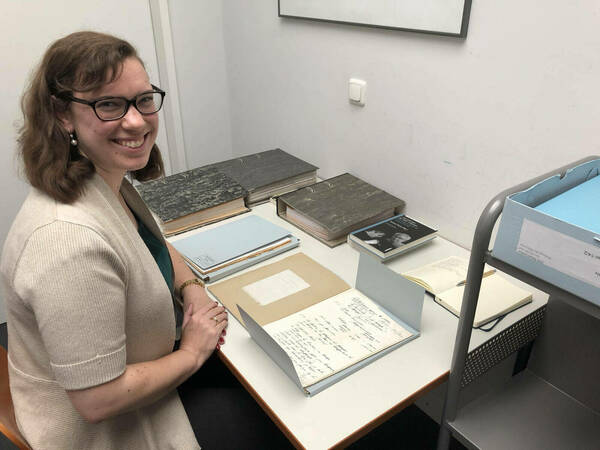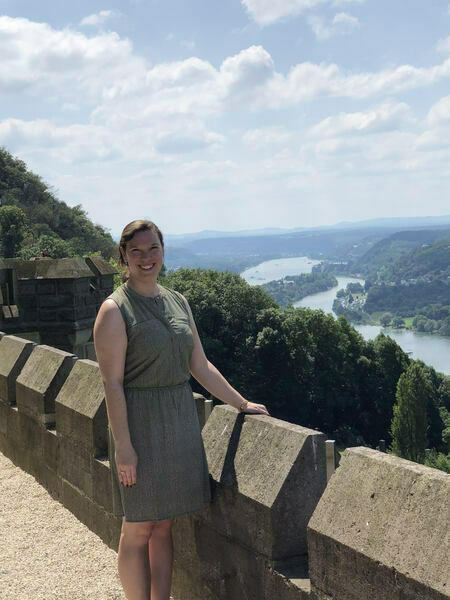

International travel came to a standstill in 2020 and 2021, but the Nanovic Institute for European Studies continued its work to create an integrated, interdisciplinary home for students and faculty to explore the evolving ideas, cultures, beliefs, and institutions that shape contemporary Europe. For Sarah Crane, a PhD candidate in peace studies and history, that meant a few different things. First, she was named a Nanovic Graduate Fellow, one of nine selected for the 2020-21 academic year. This appointment allowed her to participate more fully in the Institute’s programming. Second, Crane was able to draw on the support she received from the Institute previously—a summer travel and research grant that funded a month of research in Germany in 2019—to prepare her application for a Fulbright research grant. That groundwork paid off, and Crane received word in the spring of 2021 that she had been awarded a Fulbright to Germany for the 2021-22 academic year.
Crane’s work focuses on legal responses to the Holocaust. In her dissertation, she is examining how two trials held during the 1960s, the Frankfurt-Auschwitz Trial in Germany and the trial of Adolf Eichmann in Israel, challenge conventional understandings of the relationship between law, democracy, and the Nazi legacy in the decades following the end of the Second World War. One of the goals of her 2019 research trip was to establish a relationship with the Fritz Bauer Institute, an independent research center in Frankfurt with archival holdings that include collections for these particular trials. The institute is named after Fritz Bauer, the German Jewish prosecutor who brought the Frankfurt-Auschwitz case to trial in 1963. He is a key figure in Crane’s research.
Next year, she plans to spend most of her time at the Fritz Bauer Institute, with side trips to archives in Wiesbaden and Bonn. “I’ve really started to embrace the idea that I’ll be in Germany for 10 months,” Crane says. “I’m looking forward to getting a better sense of how Germans understand their own history.”
Crane is one of four Notre Dame graduate students and 13 recent undergraduate students who were selected for Fulbright grants to teach, study, or research in Europe in 2021. Another eight recent undergraduate alumni were chosen as alternates to European countries. “A key factor in Notre Dame’s continued success with the Fulbright U.S. Student Program is the excellent global education and scholarly engagement provided by the Keough School of Global Affairs,” says Jeff Thibert, director of the Flatley Center for Undergraduate Scholarly Engagement (CUSE). “We have seen particular success among our applicants to Europe, for instance, because their applications can build directly on the meaningful European educational and scholarly engagement experiences they have had thanks to the Nanovic Institute’s events and grant programs for research, internships, advanced language training, or travel.”
Sarah Crane’s year as a Nanovic Graduate Fellow also provided her with a different kind of support. Yes, the fellowship came with a small stipend, but the deeper value came from the act of fellowship with the eight other members of her cohort.
At first, she says, it was challenging for the group to coalesce because they came from such a wide range of disciplines—peace studies, medieval studies, English, Spanish, political science, sociology, law, and theology—and because there was little to no overlap of their research topics. “It’s an interesting experiment to get nine very different people together to talk about their very different research,” Crane says.
That challenge, of course, was combined with the distinctive 2020-21 challenge of pandemic restrictions. While the previous cohort of graduate fellows had gathered in person, shared an occasional meal, and planned a conference for the spring, Crane’s cohort was limited to interacting in Zoom meetings. By the end of the first semester, she says, their group was struggling to determine how to proceed. Anna Dolezal, Nanovic’s student programs manager, and Hildegund Müller, associate professor of classics and Nanovic faculty fellow, both offered resources and support to the group during this time—as well as the freedom for the group to determine its own direction. “We were given the space to really make this our own experience, and to make it what we wanted it to be,” Crane says.

Ultimately, the fellows decided to forego a spring conference. Online conferences “had just been everyone’s life for the past year,” she says, and they felt weary at the thought of organizing one more. But along the way, as the fellows met online every other week and took turns presenting their research, the group started to click. “Those presentations gave us enough common ground to be able to engage more significantly with each other,” Crane says. “For all of us, Europe was a touchstone—we were all interested in questions of identity, in how to understand Europe as a concept, in how we’ve understood Europe historically and what dynamics have informed that process.”
And just as Europe was a touchstone for each of the fellows, the group itself became a touchstone. “I realized how rare and rewarding it is to just be able to talk about my research and other people’s research in an accepting, low-stakes space,” says Crane. “I think most of us enter grad school with the sense that we’re going to be part of an intellectual community and we’ll have all these people to talk with about the ideas that we’re encountering and the ideas that are important to us. But then grad school starts, and there are just so many demands on our time. It’s hard to carve out the space to think and talk in a low-stakes environment.” Ultimately, the fellows decided to forego a spring conference. Online conferences “had just been everyone’s life for the past year,” she says, and they felt weary at the thought of organizing one more. But along the way, as the fellows met online every other week and took turns presenting their research, the group started to click. “Those presentations gave us enough common ground to be able to engage more significantly with each other,” Crane says. “For all of us, Europe was a touchstone—we were all interested in questions of identity, in how to understand Europe as a concept, in how we’ve understood Europe historically and what dynamics have informed that process.”
The Nanovic Graduate Fellows program was able to provide that room for—true to its name— fellowship. In the midst of the high-achieving, driven environment of graduate school, finding a space to process the experiences and lessons in a spirit of camaraderie is crucial. “When everyone around you is pushing themselves, you feel the need to be a part of that,” Crane says. “But once we all accepted that we weren’t expecting or looking for that from each other in that space—it was really nice.”
Originally published by at nanovic.nd.edu on August 02, 2021.